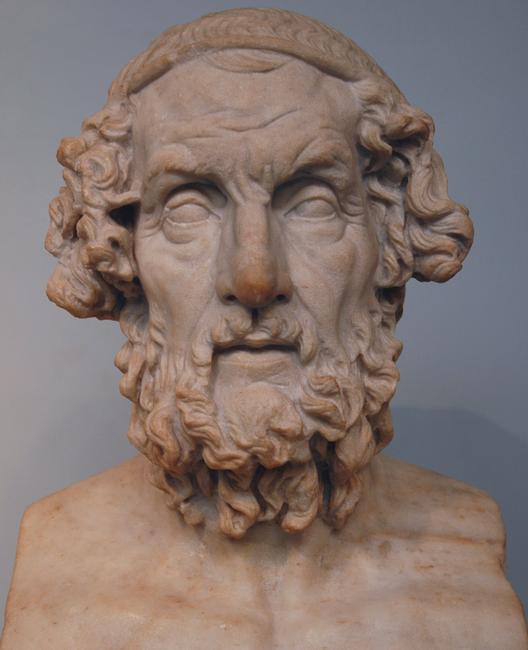|
|||
|
Philatelia.Net / The literature / Plots / The directory «Plots»Homer ( Όμηρος)Pprincipal figure of ancient Greek literature; the first European poet. Divided into 24 books, the Iliad tells of the wrath of Achilles and its tragic consequences, an episode in the Trojan War. The action is in several sections. Achilles quarrels with Agamemnon over possession of the captive woman Briseis, and Achilles retires from the war to sulk in his tent. The Greek position gradually weakens until Agamemnon offers amendment to Achilles (Books I–IX). Book X tells of an expedition by Odysseus and Diomedes leading to Greek reverses in the war. Thereupon Patroclus, Achilles’ friend, is inspired to go into battle wearing Achilles’ armor. He is killed by Hector (Books XI–XVII). The Odyssey is written in 24 books and begins nearly ten years after the fall of Troy. In the first part, Telemachus, Odysseus’ son, visits Nestor at Pylos and Menelaus at Sparta, seeking news of his absent father. He tells them of the troubles of his mother, Penelope, who is beset by mercenary suitors. Menelaus informs him that his father is with the nymph Calypso (Books I–IV). The scene then shifts to Mt. Olympus with an account of Zeus’ order to Calypso to release Odysseus, who then builds a raft and sails to Phaeacia. There he is entertained by King Alcinoüs and his daughter Nausicaä; he relates to them the story of his wanderings in which he has encountered Polyphemus, Aeolus, Circe, Scylla and Charybdis, the Sirens, the Laestrygones, and the lotus-eaters (Books V–XII). Ajman, 1970, The Judgment of Paris Ajman, 1972, The Parnassus Bhutan, 1991, Achilles slaying Hector Bhutan, 1991, Briseis Given Back to Achilles Bhutan, 1991, Briseis Given Back to Achilles Bosnia & Herzegovina, 1997, Trojan Warriors and Map Cambodge, 1983, Dante, Homer and Virgilius Central African Republic, 1999, Odisseus and Palamidus plaing chess France, 1966, Gabriel Faure and «Penelopa» Gambia, 1993, The Love of Paris and Helen German Federal Republic, 2001, Hand holding Quill German Federal Republic, 2002, Hand holding Quill Ghana, 2004, «Allegory of the Arts» Greece, 1954, Bust of Homer Greece, 1955, Bust of Homer Greece, 1959, Achilles and Pathroclus Greece, 1964, Ulysses of Ithaka Greece, 1967, Penelope (L. Drosses) Greece, 1977, Placing the Works of Homer in Achilles' tomb Greece, 1983, The Deification of Homer Greece, 1983, Abduction of Helen by Paris Greece, 1983, Wooden horse Greece, 1983, Achilles throwing dice with Ajax Greece, 1983, Hector receiving arms from his parents Greece, 1983, Battle between Ajax and Hector Greece, 1983, Priam requesting body of Hector Greece, 1983, Binding of Polyphemus Greece, 1983, Ulysses escaping from Polyphemus's cave Greece, 1983, Ulysses meeting Nausica Greece, 1983, Ulysses and Sirens Greece, 1983, Ulysses slaying suitors Greece, 1983, Heroes of Iliad Greece, 1983, Bust of Homer Greece, 1996, Homer's «Iliad» Greece, 2009, Ulysses and Sirens Grenada, 1991, The Judgement of Paris Grenada, 1993, Judgment of Paris (Watteau) Grenada Grenadines, 1993, Aristotle with the Bust of Homer Guinea, 2007, «Troy», «Fight Club» Guinea Bissau, 2005, The Judgment of Paris Guinea Bissau, 2005, The Judgment of Paris Liberia, 1985, Judgment of Paris (Rubens) Luxemburg, 2007, Calliope and Homer Manama, 1971, The Judgement of Paris Manama, 1971, The Judgement of Paris (Niklaus Manuel Deutsch) Manama, 1972, Aristotle with the Bust of Homere Mauritanie, 1968, The Iliad Mauritanie, 1968, The Odyssey Netherlands Antilles, 2003, Ulisses and Sirens Paraguay, 1967, Maecenas Presenting the Liberal Arts to Emperor Augustus Paraguay, 1970, The Judgement of Paris Paraguay, 1977, The Judgement of Paris (Gérard de Lairesse) Paraguay, 1978, The Judgement of Paris Paraguay, 1981, The Judgement of Paris Rumania, 1968, The Jugment of Paris (Hendric van Balen) S. M. O. M., 2004, Alexander the Great on Achilles' tomb Sao Tome e Principe, 1977, Judgment of Paris Sao Tome e Principe, 2003, Maecenas Presenting the Liberal Arts to Emperor Augustus Sao Tome e Principe, 2008, The Hermit and the Sleeping Angelicaá The Judgement of Paris Sao Tome e Principe, 2010, The Judgment of Paris Sierra Leone, 1996, Odysseus and siren Sierra Leone, 1996, Poseidon Sierra Leone, 2001, Xantus and Balius pulling Achilles chariot Sierra Leone, 2006, Homer St. Vincent, 1993, The Apotheosis of Homer St. Vincent, 2001, Polyphemus USSR, 1968, Bust of Homer (Geliy Korzhev) USSR, 1984, «Landscape with Polyphemus» (Nicolas Poussin) Vatican, 1997, General rewewing his soldiers Russia, 1994, USSR, 1968.05.08, Advertising: https://decaf-coffee.ru êîôå áåç êîôåèíà êóïèòü êîôå áåç êîôåèíà. |
|||
© 2003-2025 Dmitry Karasyuk. Idea, preparation, drawing up
|

